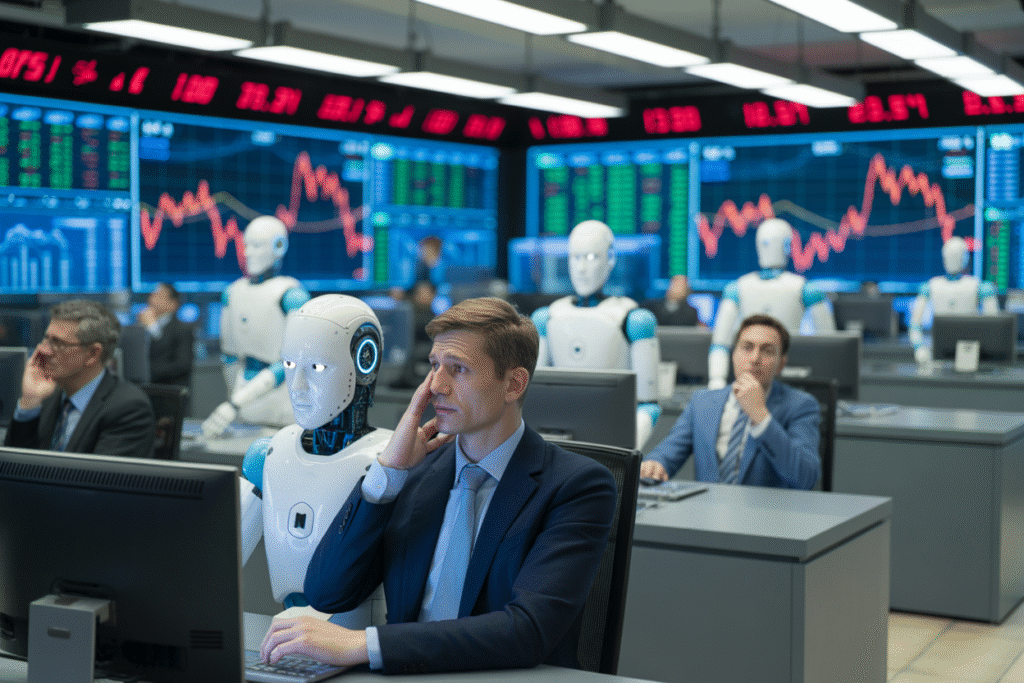AI is deleting middle-class jobs faster than we can retrain workers—here’s the real story.
AI replacing humans used to sound like science fiction. Today it reads like a spreadsheet—row after row of layoffs, each cell a life upended. This post unpacks the raw numbers, the ethical landmines, and the narrow window we still have to steer the future before it steers us.
The Pink-Slip Avalanche
The numbers are brutal. In the last twelve months, more than 600,000 tech workers have been shown the door. Banks are quietly preparing to cut another 200,000. Even the IRS is automating audits that once kept thousands of clerks busy. AI replacing humans isn’t a distant headline—it’s a Monday morning email that starts with “We regret to inform you.”
Every pink slip lands like a question: if algorithms can do the work faster and cheaper, what’s left for the rest of us?
The Myth of Liberation
CEOs love to frame AI as liberation. They promise employees will be “freed” from repetitive tasks to pursue creative dreams. Yet the same executives brag to investors about “head-count reductions” and “margin expansion.”
Take Klarna. After laying off 700 customer-service reps, the buy-now-pay-later giant rehired many of them—this time as gig contractors without benefits. Same work, lower pay, zero safety net. The AI didn’t just replace jobs; it rewrote the social contract.
When profit is the only metric, humans become rounding errors.
The Vanishing Entry Level
Picture a 24-year-old analyst who spent four years and six figures on a finance degree. On her first day, she’s handed a laptop and told to “train the model” that will eventually replace her. By Friday, the model is faster. By month’s end, she’s updating her résumé.
Anthropic’s CEO predicts half of all entry-level white-collar roles could vanish within five years. Salesforce already claims 50 percent of its internal tasks are handled by AI. The entry-level rung is being sawed off while nobody’s looking.
What happens to a generation that can’t get its foot in the door?
Ethics on Autopilot
The ethical debate isn’t just about lost paychecks—it’s about lost dignity. When AI systems make hiring, firing, and surveillance decisions, accountability evaporates. A résumé rejected by an algorithm has no appeal process. A worker flagged for “low productivity” by keystroke tracking has no recourse.
Regulators are scrambling. The EU’s AI Act tries to classify risk levels, but lobbyists water down every clause. In the U.S., Congress can’t even agree on basic definitions. Meanwhile, companies deploy black-box systems that decide who eats and who doesn’t.
Who gets blamed when the machine gets it wrong?
The Crossroads
We stand at a fork in the road. Path one: chase short-term gains, watch inequality explode, and deal with the social fallout later. Path two: treat AI as a public utility—invest in retraining, universal basic services, and strict oversight.
History offers a clue. When ATMs arrived, everyone feared bank tellers would vanish. Instead, banks opened more branches and hired more people—because the tech was paired with smart policy. The same can happen here, but only if we demand it.
The question isn’t whether AI will replace humans. It’s whether we’ll let it replace our humanity.


